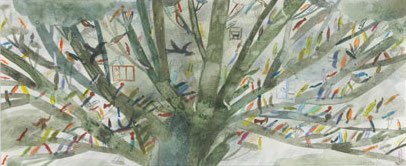Be the change that you wish to see in the world ~ Mahatma Gandhi
If I had to name the theme I am most drawn to in children’s literature, it would be the transformational power of nature. It must have started with a youthful reading of The Secret Garden, or perhaps it’s a Canadian thing, but whatever the source, a walk in the woods can do wonders, figuratively of course, and also metaphorically, in books. But what if there are no woods? Arguably, children’s books that reflect (and celebrate) the urban experience are growing in frequency and popularity, but few deal directly with the other side of city life – the concrete wastelands that are the byproduct of urban decay and our ever growing estrangement from the natural world.
Most children’s books tend toward the utopian, especially in terms of setting. In The Promise, Nicola Davies and Laura Carlin hold up a mirror to our dying, degraded cities, and then, with a simple gesture, present us with a most beautiful and transformational resolution.
It is unclear whether The Promise is set in the present, or in a dystopian future, but the initial pages suggest a parched world where nothing grows. Carlin’s illustrations, stunning in their cool, abstract beauty, depict scenes bereft of colour: bleak, industrial, and entirely cheerless. The patchwork of buildings, distinguished only by the number of blackened windows, seem lifeless. The are streets empty, but for a few dogs and a scattering of people, all of whom reflect the broken connections of a town that has lost its way. There are many types of disconnection in Davies’ evocative tale, but threading through all is the disconnect from nature. In a harsh and ungiving environment, the people have lost the ability to find fellowship with each other. The young girl at the centre of the story does not distinguish herself from the ‘mean, hard and ugly’ people of her community. Indeed, she will even steal a bag from an old woman.
This is where The Promise takes flight. After a struggle, the old woman promises to let the bag go if the girl promises to plant what is within. Dismissing her words, the girl makes the promise, and is surprised to find neither food nor money in the bag, but acorns.
“I stared at them, so green, so perfect, and so many, and I understood the promise I had made. I held a forest in my arms, and my heart was changed.”
Like a Johnny Appleseed for the 21st century, she sets off on her journey, planting the acorns along roadways, train tracks, apartment buildings, abandoned parks; anywhere, and everywhere. When the trees begin to sprout, the people are curious. Curiosity soon gives way to wonder. Wonder gives way to joy. As life returns to the city, a community is reborn, and the pages of The Promise fill with breathtaking, transcendent colour.
“Green spread through the city like a song, breathing to the sky, drawing down the rain like a blessing.”
Her mission continues, to other ‘sad and sorry’ cities, until she has, in turn, become an old woman with a bag of acorns. It is at this point she begins to narrate her story.
What is most profound about The Promise is that Nicola Davies takes a complex issue like urban decay, and shows us in simple, elegant prose the human cost – in a state of nature deficit, we cannot thrive. We may not even be able to live. More importantly, she places the responsibility for change on individual acts of stewardship. An important lesson not just for kids, but for everyone.
The Promise is a deeply moving and gloriously illustrated book that does not shy away from scenes of despair, nor does it suffer from a failure of the imagination, like so many other stories with an environmental message. On the contrary, Davies and Carlin envision a brighter, more communal, and nature-abundant future, in the actionable now.
Nicola Davies is a zoologist and an award winning author of many nature-centric books for children. Clearly, she is a woman who has taken a walk or two in the woods. A woman, in other words, after my own heart.
The Promise is Laura Carlin’s first picture book, which is rather astounding. A graduate of the Royal College of Art in London, Ms Carlin has recently illustrated The Iron Man by Ted Hughes.
The Promise by Nicola Davies, illustrations by Laura Carlin. Candlewick Press, 2014
For additional reading along a similar vein, I would suggest The Curious Garden by Peter Brown, which is based on the guerrilla gardening movement on Manhattan’s abandoned High Line.
On a related note, I love this Ted Talk by Amanda Burden, former city planner for New York, on how public spaces make cities work.





